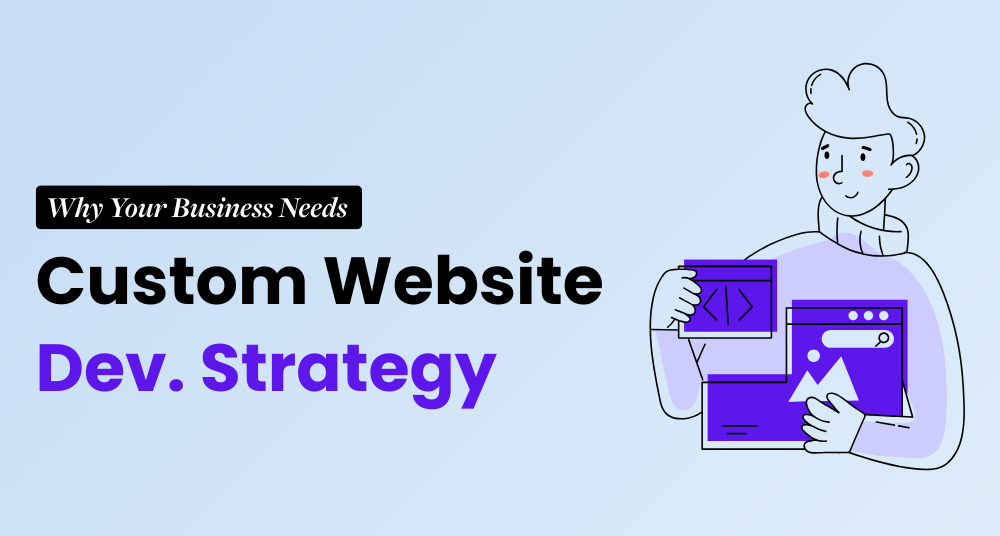In today’s fast-paced, digital-first world, every business, large or small, needs a strong online presence. A website is often the first point of contact between a business and its potential customers, and it serves as a digital storefront where interactions can happen 24/7. However, with millions of websites available, merely having an online presence is no longer enough. To truly stand out in this crowded marketplace, your business needs a custom website development strategy.
In this guide, we will explore why a tailored approach to website development is essential, the benefits it offers, and how to go about creating a strategy that works for your unique business goals.
The Importance of a Custom Website Development Strategy
A custom website development strategy is not just about making a website look good. It’s about creating an online experience that is finely tuned to meet the needs of your business and your customers. Off-the-shelf templates or generic website designs may get the job done on the surface, but they lack the depth, flexibility, and scalability that your business requires to grow and thrive.
Let’s dive into why a custom approach is crucial:
Reflect Your Brand Identity
A website is an extension of your business and its brand identity. When you opt for a custom website, you have complete control over its design, structure, and functionality, ensuring it reflects your company’s unique personality. A custom-built website allows you to integrate your branding elements – such as logos, color schemes, and typography – to create a cohesive and professional online presence.
The result? A website that doesn’t just look like any other. It becomes a digital representation of your brand that resonates with your audience.
Enhanced User Experience (UX)
User experience is one of the most important factors in determining whether your visitors stay on your site or bounce off. When you work with custom website development, you can design a user-centric interface that simplifies navigation, prioritizes the most important features, and ultimately guides visitors to take the actions you want them to.
Custom development allows you to tailor the flow of your website, making sure the journey your users take is intuitive, fast, and satisfying. This attention to detail is impossible to achieve with off-the-shelf solutions, which may offer limited customization options for user experience.
Scalability and Flexibility
As your business grows, so do your needs. A custom-built website can be developed with scalability in mind, making it easy to expand or add new features as your company evolves. Whether you need to add an e-commerce platform, integrate customer relationship management (CRM) tools, or include a blog or portfolio section, a custom site is built to scale with your business.
With a pre-built website, you may hit limitations or find it difficult to add new functionalities that align with your business’ changing needs. A custom strategy ensures that your website grows with you, eliminating the need for costly redesigns down the line.
Better Performance and Speed
Website speed is crucial for user satisfaction and search engine rankings. A custom website gives developers the freedom to optimize every aspect of the site, from the backend code to the front-end design, ensuring fast loading times and smooth functionality. Pre-designed templates can often contain unnecessary code or slow-loading elements, which negatively impact the user experience.
Additionally, search engines like Google prioritize fast-loading websites. By having a custom-built site, you ensure that your site performs well across various devices and platforms, boosting your SEO efforts.
Improved Security
Cybersecurity is a growing concern for businesses, especially those handling sensitive customer data. Pre-built website solutions may not be as secure as a custom-built one. With a custom website, you have the opportunity to implement the latest security measures, such as SSL certificates, secure payment gateways, and data encryption, to protect both your business and your customers.
Your custom website can be developed with the latest security patches and coding practices, ensuring it is safeguarded against potential threats, which is crucial for building customer trust and confidence.
Unique Functionality
Your business likely has specific goals and processes that off-the-shelf website templates simply can’t accommodate. A custom website can be designed with the specific functionality you need to meet your business requirements. Whether that involves custom booking systems, user dashboards, payment solutions, or integrations with third-party tools, a custom strategy allows you to develop a website that works exactly how you want it to.
With pre-designed websites, you may find yourself compromising on functionality, settling for generic solutions that may not address your unique business needs. Custom websites, on the other hand, allow you to be as creative and innovative as necessary.
Better SEO and Digital Marketing Integration
Search engine optimization (SEO) is an ongoing process, and a custom-built website offers far greater control over your site’s SEO strategy. From on-page SEO elements like meta tags and URL structure to optimizing for speed and mobile responsiveness, a custom website can be designed with SEO best practices in mind from the very beginning.
Furthermore, a custom site allows you to easily integrate various digital marketing tools, including Google Analytics, social media, email marketing systems, and lead generation forms, ensuring that your marketing efforts are aligned and trackable.
Long-Term Cost-Effectiveness
At first glance, custom website development may seem like an expensive option. However, when you consider the long-term benefits, it can prove to be a more cost-effective solution. Custom sites are built to be future-proof, with updates and adjustments being easier and more affordable to implement over time.
On the other hand, pre-built websites may require costly add-ons, plugins, or even complete overhauls down the road to address the limitations of the template you initially selected.
How to Create a Custom Website Development Strategy
Now that we understand why a custom website is crucial, let’s look at how you can create a strategy to build one that meets your needs. Here’s a step-by-step guide:
Define Your Goals and Objectives
Before jumping into development, take the time to define what you want your website to achieve. Are you focusing on generating leads? Improving brand awareness? Enhancing customer service? Having clear objectives will help guide the entire development process.
Identify Your Target Audience
Your website’s design, functionality, and messaging should all cater to your target audience. Understand who your customers are, their pain points, preferences, and behaviors. This knowledge will inform the design choices you make to provide an optimal experience for them.
Choose the Right Web Development Team
Whether you choose to work with an agency or hire freelance developers, selecting a team with the expertise to bring your vision to life is crucial. They should have experience in custom website design, development, and UX/UI best practices, as well as knowledge of SEO and security.
Plan the Site Structure and User Flow
Outline how your website will be structured and how users will navigate through it. Create a sitemap and consider the overall user flow, making sure to prioritize ease of use and accessibility. This is where you’ll decide on the core pages and functionalities your site needs, from product pages to contact forms.
Focus on Mobile Optimization
Given the increasing number of users browsing via smartphones and tablets, it’s essential that your custom website is mobile-friendly. Make sure your design is responsive and looks great across all devices, ensuring users have a seamless experience no matter how they access your site.
Implement Robust Analytics
From day one, integrate tools like Google Analytics to track user behavior, measure website performance, and make data-driven decisions for continuous improvement.
Regular Maintenance and Updates
A website is not a one-time project – it requires ongoing maintenance. Ensure that your custom website is regularly updated with fresh content, security patches, and improvements to meet evolving user needs.
Conclusion
Having a custom website development strategy is an essential component of building a business that thrives in today’s competitive digital landscape. It allows you to create a site that not only reflects your brand but also provides an exceptional user experience, ensures scalability, improves performance, and stays secure over time. With a well-thought-out strategy, your website can serve as a powerful tool that drives business growth and fosters long-term customer relationships.






What do you think?
It is nice to know your opinion. Leave a comment.